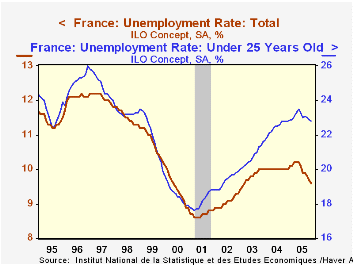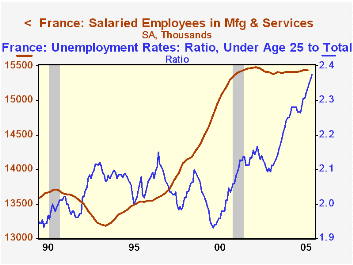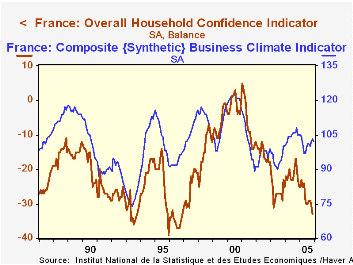 Global| Dec 30 2005
Global| Dec 30 2005French Unemployment Decreases in November, Even in the Midst of Social Unrest
Summary
On this last business day of 2005, the French statistics compilers, the National Institute for Statistics and Economic Studies (INSEE) reported unemployment data for November. The rate fell to 9.6% from 9.7% in October, the fifth [...]

On this last business day of 2005, the French statistics compilers, the National Institute for Statistics and Economic Studies (INSEE) reported unemployment data for November. The rate fell to 9.6% from 9.7% in October, the fifth decrease in the last six months. This ought to be good news and is especially impressive as it indicates that unemployment at least did not suffer immediately from the widespread riots that took place in the nation in late October and early November.
At the same time, among the major world events of this past year, perhaps these riots were the most directly connected to economic conditions. As we have described here before -- in fact, on September 30, less than a month before the riots began -- unemployment is especially severe for French youth and their relative job market status has worsened. The first two rows of the table below show this easily. The overall unemployment rate is now at the lowest since March 2003, but the rate for would-be workers under age 25 is 22.8%, 2.6 percentage points higher its March 2003 value of 20.2%.
Part of the problem is that jobs are not increasing in France. A quick look at our table and the second graph shows that employment has been basically stagnant since the middle of 2001; over these last several years, the ratio of youth unemployment to the overall rate has climbed steeply, suggesting that older workers are holding jobs better than young people.
We wondered about the economic impact of the riots themselves, but much French data for these months is not yet available. Business and consumer surveys, however, hint at a differential influence. INSEE's household confidence survey "confidence indicator" dropped 3 points to -33 in November, its worst since November 1996, nine years ago. People seem most concerned about their finances, and actually less worried about unemployment, so this deterioration could result from energy prices more than social unrest. Even so, the response is pronounced. December data are due for release Thursday, January 5.
Business confidence has held up recently, though. The "Business Climate Indicator" is not at a high level, but it rose noticeably throughout the second half of 2005. French stock prices have also increased, including a rise this month to the highest monthly close since early 2001. Thus, business leaders and investors feel differently than consumers have about the present state of the French economy, and as shown in the chart of confidence indicators, such divergences are rare. The nation seems to face an uncertain course as 2006 begins.
| France: Selected Data | Dec 2005 | Nov 2005 | Oct 2005 | Sept 2005 | 2004 | 2003 | 2002 |
|---|---|---|---|---|---|---|---|
| Unemployment Rate (%) | 9.6 | 9.7 | 9.8 | 10.0 | 9.8 | 9.1 | |
| Under 25 Yrs | 22.8 | 22.9 | 23.0 | 22.4 | 20.7 | 19.3 | |
| Employment (000s) | 15,444 | 15,404 | 15,403 | 15,466 | |||
| Household Confidence Survey | -33 | -30 | -29 | -22 | -27 | -16 | |
| Financial Condition Past 12 Months | -26 | -25 | -22 | -16 | -15 | -11 | |
| Business Climate | 102 | 103 | 102 | 100 | 105 | 95 | 97 |
| Stock Price CAC 40, EOP | 4716.62 | 4567.41 | 4436.45 | 4600.02 | 3821.16 | 3557.90 | 3063.91 |
Carol Stone, CBE
AuthorMore in Author Profile »Carol Stone, CBE came to Haver Analytics in 2003 following more than 35 years as a financial market economist at major Wall Street financial institutions, most especially Merrill Lynch and Nomura Securities. She had broad experience in analysis and forecasting of flow-of-funds accounts, the federal budget and Federal Reserve operations. At Nomura Securities, among other duties, she developed various indicator forecasting tools and edited a daily global publication produced in London and New York for readers in Tokyo. At Haver Analytics, Carol was a member of the Research Department, aiding database managers with research and documentation efforts, as well as posting commentary on select economic reports. In addition, she conducted Ways-of-the-World, a blog on economic issues for an Episcopal-Church-affiliated website, The Geranium Farm. During her career, Carol served as an officer of the Money Marketeers and the Downtown Economists Club. She had a PhD from NYU's Stern School of Business. She lived in Brooklyn, New York, and had a weekend home on Long Island.
More Economy in Brief
 Global| Feb 05 2026
Global| Feb 05 2026Charts of the Week: Balanced Policy, Resilient Data and AI Narratives
by:Andrew Cates





